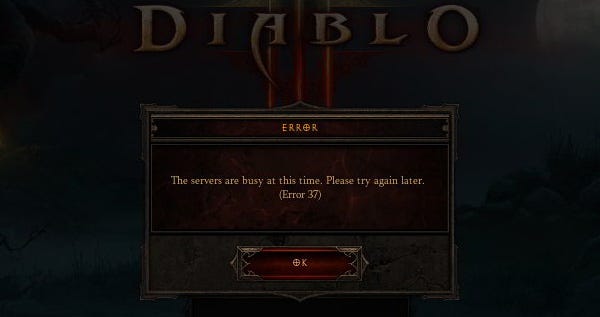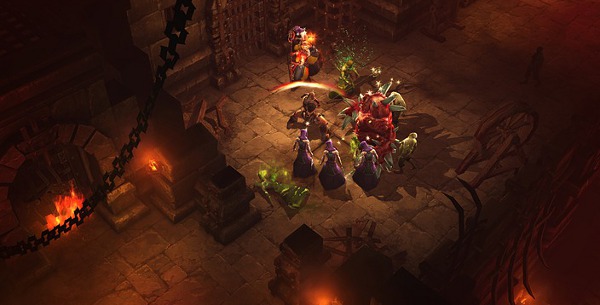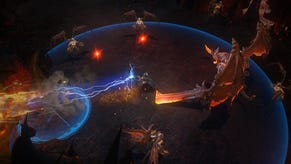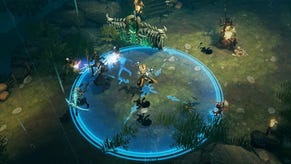Opinion: Why The Problem With Diablo Isn't Diablo
Give us options, not requirements
A videogame came out recently. If you consider yourself part of the unruly mass that is Everyone On Earth, you're probably playing it, thinking about it, dreaming about it, or stroking it in a none-too-subtly suggestive fashion right now. (Stop that, by the way. It's really weird.) Or, you know, you're not. Because - given Blizzard's track record so far - there's a very good chance the servers are down, or lag has hurled you into a minefield of hungry, hungry Diablos, or the unnatural reaction that is Templar-meets-shield has broken reality again. I imagine you're angry. It's only natural, after all. You've waited more than a decade, and you just want to dive headfirst into hell while the hype fires are still at their brightest. Really, though, it's probably only a matter of time before PC gaming's most massively successful giant steamrolls the kinks and turns this nightmarish launch into an ugly, short-lived (in the grand scheme of things) memory.
That perspective in mind, it's easy to watch the pitchfork-and-torch-wielding hordes storming Blizzard's walls and think "Yuck, these people sure are blowing things out of proportion - just like they always do." So a major game launch came down with a fairly violent case of the hiccups. Don't they all? And now Blizzard's apologized, so what more could these people possibly want? At this point, you're just waiting for whiners to swallow this bitter pill and eat their words so they can inevitably start singing Diablo's praises again. That mentality, however, is precisely why I'm begging you: please stay angry.
Always online, never offline, DRM, a service - call it whatever you want. The fact is, Blizzard's going all-in with this system, and other developers and publishers are watching. Unlike, say, Ubisoft, whose Internet umbilical cord was vestigial at best and a ball-and-chain that offered no real benefits to legitimate customers at worst, Blizzard's keeping much of Diablo's very essence server-side. Crucial data, the auction house, and - of course - single-player aren't just tethered to a connection; they're tied intrinsically to it. No mods, option to take the game on the road, or even a pause button? No problem, says Blizzard. The benefits outweigh the costs.
Or at least, that's the hope in the long run. Really, though, I'm pretty optimistic about Blizzard's chances of eventually executing its vision in full - even if that doesn't necessarily make everyone say, "Mods? Pfft, they were never that great. That's why Day Z never caught on." After all, you'll notice that the likes of Diablo, Diablo II, and StarCraft continue to have servers of their own and receive updates to this day.
World of Warcraft's launch, too, was rockier than an army of Sylvester Stallones, but Blizzard did smooth things over with time. As a result, slowly but surely, people stopped caring about initial missteps. Love it or hate it, WoW was - for its time - an incredibly tightly designed experience that changed the way everyone looked at MMOs. It was, for lack of a more elaborate term, really, really good. That, of course, is how people remember WoW now. And why shouldn't they?
But, while that's comforting in the short term, it could also eventually evolve into a ten-mouthed, hundred-eyed monster of a problem. There are, after all, numerous benefits to this type of service (potentially seamless service for players and built-in anti-piracy measures for developers - among many others), but - less encouragingly - not everyone is Blizzard. So it's far from surprising that plenty of prominent figures in the game development community wouldn't mind seeing Blizzard pave this system's way to widespread acceptance. This particular quote from id Software's Tim Willits, especially, sticks out:
“Diablo III will make everyone else accept the fact you have to be connected. If you have a juggernaut, you can make change. I’m all for that. If we could force people to always be connected when you play the game, and then have that be acceptable, awesome. In the end, it’s better for everybody. Imagine picking up a game and it’s automatically updated. Or there’s something new you didn’t know about, and you didn’t have to click away. It’s all automatically there. But it does take juggernauts like [Diablo III] to make change.”
And in an ideal world, I'd have far less of a problem with what Willits said. Servers and services willing, it could be impressively convenient. But - even when/if Diablo flushes out the hive of bugs currently infesting its infrastructure - we'll still be left with a swarm of extremely frightening questions. Foremost, if these Always On 2.0 services really catch on, what happens when a publisher or developer without Blizzard's dedication and resources finds itself with heavy upkeep costs and dwindling player counts?
On that note, it's very worrying that EA's sighted gold in these here hills with SimCity. The less-than-loved publisher, after all, has a pretty horrible reputation for cutting a swathe through crowds of multiplayer servers in one fell swoop - sometimes incredibly prematurely. Yes, many of these online features sound very fascinating, but will they have a shelf life? And if not, how badly does that hurt the solo experience allegedly built with online features in mind?
We have to demand a standard of quality and dedication from these things. If we try to paint complaints about Diablo III's loudly reverberating server-side-down bellyflop as entirely immature, wrong, and entitled, we're basically saying, "Look, everyone else! We're totally OK with this." I mean, Diablo III's almost assuredly sold millions of units by this point. If widespread rage then proves relatively short-lived, I have to imagine that looks like pretty much all upside to, say, Tim Willits or even devs/pubs whose intentions aren't quite so benevolent or design-focused. Piggy banks are happy, and customers are happy. What more do you need?
At the very least, I still contend that a dedicated, server-free single-player option is a no-brainer in this case and others like it. Yes, some of Diablo III's online features are great, but give us options - not suffocating requirements. Even so, in the long run, Diablo probably won't be the big problem here. It's the next wave of "always connected" games that we need to worry about - the one's that attempt to follow its lead. So stay angry. Keep demanding an offline option, if nothing else. People may tell you to clam up because this system - while flawed - works more often than not. But I think $60/£45 is a pretty extravagant price to pay for something that "just works."


















